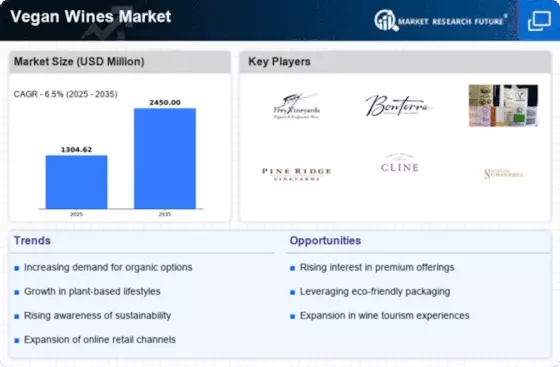Market Share
Europe Vegan Wines Market Share Analysis
In the expanding landscape of the Europe Vegan Wines market, companies employ various strategies to secure their portion of the market share. One prevalent tactic is differentiation, where brands emphasize unique attributes to stand out amidst competition. This could involve highlighting specific grape varieties, winemaking techniques, or regional origins to appeal to discerning consumers. By positioning themselves as distinct from other wine producers, companies aim to capture the attention of niche segments of the market and cultivate brand loyalty among consumers who prioritize vegan and sustainable products.
Pricing strategies also play a crucial role in market share positioning within the Europe Vegan Wines market. Some brands opt for premium pricing, positioning themselves as high-quality offerings targeted at connoisseurs and enthusiasts willing to pay a premium for superior taste and ethical production practices. Conversely, there are brands that adopt a more affordable pricing strategy, aiming to capture a larger market share by appealing to budget-conscious consumers. Price promotions, discounts, and bundle deals are common tactics used to entice consumers and gain a competitive advantage in the market.
Furthermore, distribution channels are integral to market share positioning in the Europe Vegan Wines market. Companies strategically utilize various distribution channels such as specialty wine shops, organic supermarkets, online retailers, and direct-to-consumer sales to reach their target audience. By ensuring widespread availability and accessibility of their products, brands can effectively penetrate different market segments and increase their market share. Partnerships with distributors and retailers can also help brands secure prominent shelf space and visibility, further enhancing their competitive position in the market.
Brand image and marketing efforts are also significant factors influencing market share positioning in the Europe Vegan Wines market. Building a strong brand identity centered around values such as sustainability, animal welfare, and ethical sourcing resonates with consumers who prioritize these values. Effective marketing strategies, including social media campaigns, influencer partnerships, and experiential events, can help raise brand awareness and foster consumer engagement. By consistently communicating their commitment to vegan principles and environmental stewardship, brands can differentiate themselves and attract a loyal customer base.
Moreover, innovation plays a vital role in maintaining a competitive edge and capturing market share in the Europe Vegan Wines market. Companies invest in research and development to introduce new grape varieties, winemaking techniques, and packaging innovations that cater to evolving consumer preferences and trends. Whether it's producing innovative blends, experimenting with sustainable packaging materials, or implementing eco-friendly production practices, innovation allows brands to stay relevant and capture the attention of consumers in a crowded market landscape.
Additionally, strategic partnerships and collaborations can provide brands with opportunities to expand their market share and reach new audiences. Teaming up with vegan influencers, ethical organizations, or sustainable food events can help brands tap into niche communities and gain credibility among conscious consumers. Collaborations with restaurants, bars, and wine clubs can also help increase brand exposure and drive sales. By leveraging the strengths and resources of strategic partners, brands can enhance their market position and capitalize on growth opportunities in the competitive Europe Vegan Wines market.







Leave a Comment